 |
 |
 |
 |
 |
 |
| |
 |
|
 |
 |
 |
  |
  |
 |
 |
 |
 |
|
|
 |
|
 |
 |
 |
BUILDING |
 |
|
 |
|
 |
 |
 |
| |
 |
| 
 |
Serpentine Gallery Pavilion
|
|
 |
 |
 |
 |
DESIGNER |
 |
|
|
 |
|
 |
 |
 |
| |
 |
|
 |
 |
 |
 |
DESCRIPTION |
 |
|
|
 |
|
 |
 |
 |
| . |
 |
|
 |
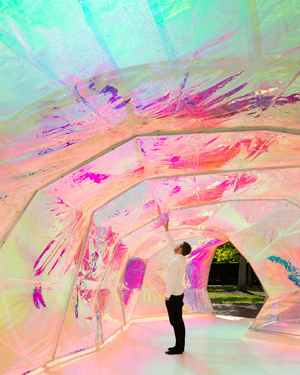 Serpentine Galleries celebrates the 15th anniversary of the world-renowned Pavilion commission with a design by Spanish architects selgascano. Serpentine Galleries celebrates the 15th anniversary of the world-renowned Pavilion commission with a design by Spanish architects selgascano.
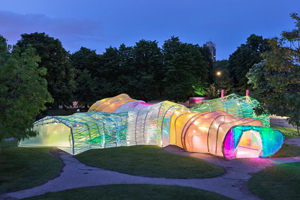 Since it was launched in 2000 by Gallery Director Julia Peyton-Jones, the Serpentine Pavilion has become an international site for architectural experimentation, presenting inspirational temporary structures by some of the world's greatest architects, including Peter Zumthor, 2011; Frank Gehry, 2008; Rem Koolhaas and Cecil Balmond, with Arup, 2006; Oscar Niemeyer, 2003; Daniel Libeskind with Arup, 2001 and Zaha Hadid, who designed the inaugural Pavilion in 2000. A much-anticipated landmark in London each summer, the Pavilion is one of the top-ten most visited architectural and design exhibitions in the world. Since it was launched in 2000 by Gallery Director Julia Peyton-Jones, the Serpentine Pavilion has become an international site for architectural experimentation, presenting inspirational temporary structures by some of the world's greatest architects, including Peter Zumthor, 2011; Frank Gehry, 2008; Rem Koolhaas and Cecil Balmond, with Arup, 2006; Oscar Niemeyer, 2003; Daniel Libeskind with Arup, 2001 and Zaha Hadid, who designed the inaugural Pavilion in 2000. A much-anticipated landmark in London each summer, the Pavilion is one of the top-ten most visited architectural and design exhibitions in the world.
selgascano’s design for the 15th Pavilion reveals an amorphous, double-skinned, polygonal structure consisting of panels of a translucent, multi-coloured fluorine-based polymer (ETFE) woven through and wrapped like webbing. Visitors can enter and exit the Pavilion at a number of different points, passing through a ‘secret corridor’ between the outer and inner layer of the structure and into the Pavilion’s colourful interior. The architects’ inspiration not only came from the site itself, but from the ways in which people move through London, notably the London Underground with its many-layered, chaotic yet structured flow. |
|
 |
 |
 |
|
 |
|
| Serpentine Galleries Director, Julia Peyton-Jones and Co-DirectorHans Ulrich Obrist said |
 |
|
 |
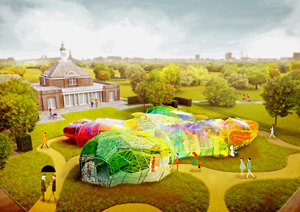 ‘We are proud to work with SelgasCano in this, the 15th year of a commission unique in the western world that continues to showcase some of the boldestand innovative designs in contemporary architecture internationally. In keeping with their reputation for playful designs and bold use of colour, SelgasCano’s structure will be an extraordinary chrysalis-like structure, as organic as the surrounding gardens. We can’t wait to go inside to experience the light diffused through the coloured panels like stained glass windows. It will be a place for people to meet, to have coffee and to experience the live events we put on throughout the summer.’ ‘We are proud to work with SelgasCano in this, the 15th year of a commission unique in the western world that continues to showcase some of the boldestand innovative designs in contemporary architecture internationally. In keeping with their reputation for playful designs and bold use of colour, SelgasCano’s structure will be an extraordinary chrysalis-like structure, as organic as the surrounding gardens. We can’t wait to go inside to experience the light diffused through the coloured panels like stained glass windows. It will be a place for people to meet, to have coffee and to experience the live events we put on throughout the summer.’ |
|
 |
 |
 |
|
 |
|
| The architects describe their design |
 |
|
 |
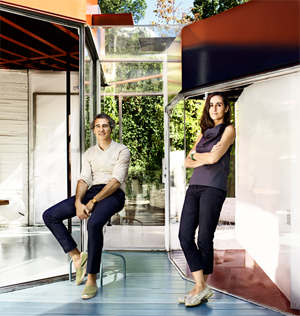 ‘When the Serpentine invited us to design the Pavilion, we began to think about what the structure needed to provide and what materials should be used in a Royal Park in London. These questions, mixed with our own architectural interests and the knowledge that the design needs to connect with nature and feel part of the landscape, provided us with a concept based on pure visitor experience. We sought a way to allow the public to experience architecture through simple elements: structure, light, transparency, shadows, lightness, form, sensitivity, change, surprise, colour and materials. We have therefore designed a Pavilion which incorporates all of these elements. The spatial qualities of the Pavilion only unfold when accessing the structure and being immersed within it. Each entrance allows for a specific journey through the space, characterised by colour, light and irregular shapes with surprising volumes. This is accomplished by creating a double-layered shell, made of opaque and translucent fluorine-based plastic (ETFE) in a variety of colours. ‘When the Serpentine invited us to design the Pavilion, we began to think about what the structure needed to provide and what materials should be used in a Royal Park in London. These questions, mixed with our own architectural interests and the knowledge that the design needs to connect with nature and feel part of the landscape, provided us with a concept based on pure visitor experience. We sought a way to allow the public to experience architecture through simple elements: structure, light, transparency, shadows, lightness, form, sensitivity, change, surprise, colour and materials. We have therefore designed a Pavilion which incorporates all of these elements. The spatial qualities of the Pavilion only unfold when accessing the structure and being immersed within it. Each entrance allows for a specific journey through the space, characterised by colour, light and irregular shapes with surprising volumes. This is accomplished by creating a double-layered shell, made of opaque and translucent fluorine-based plastic (ETFE) in a variety of colours.
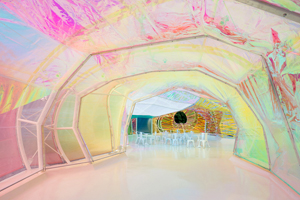 At the heart of the Pavilion is an open space for gathering as well as a café. We are also very much aware of the Pavilion’s anniversary in our design for the 15th annual commission. The structure therefore had to be – without resembling previous Pavilions – a tribute to them all and a homage to all the stories told within those designs.’ At the heart of the Pavilion is an open space for gathering as well as a café. We are also very much aware of the Pavilion’s anniversary in our design for the 15th annual commission. The structure therefore had to be – without resembling previous Pavilions – a tribute to them all and a homage to all the stories told within those designs.’ |
|
 |
 |
 |
|
 |
|
| Tom Webster, UK Associate Director, Structures, AECOM said: |
 |
|
 |
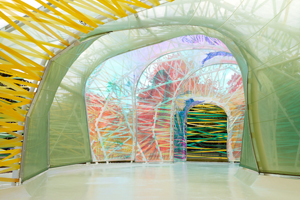 “We had to push engineering innovation to its limits to achieve the architects’ goal of movement and lightness. Our minimalist steel frame provides the canvas for the colourful cladding to deform and deflect within a dynamic structure. This juxtaposition of weightlessness and solidity is just one of the building’s inherent contrasts. The Serpentine Pavilion commission is famous for pushing boundaries in architectural design and as engineers we must match this creativity. Our role is to solve technical challenges to transform vision into reality.” “We had to push engineering innovation to its limits to achieve the architects’ goal of movement and lightness. Our minimalist steel frame provides the canvas for the colourful cladding to deform and deflect within a dynamic structure. This juxtaposition of weightlessness and solidity is just one of the building’s inherent contrasts. The Serpentine Pavilion commission is famous for pushing boundaries in architectural design and as engineers we must match this creativity. Our role is to solve technical challenges to transform vision into reality.” |
|
 |
 |
 |
|
 |
|
| Serpentine Galleries Pavilion History |
 |
|
 |
Since the commission was launched in 2000 by Director Julia Peyton-Jones, the annual Serpentine Pavilion – unique in terms of its conception, delivery and fundingmodel – has been designed by some of the world's greatest architects, including Zaha Hadid, Oscar Niemeyer, Rem Koolhaas and Cecil Balmond, Frank Gehry and Jean Nouvel. Projects have ranged from SANAA’s floating, aluminium cloud in 2009 to Peter Zumthor’s zen-like garden enclosurein 2011 to Smiljan Radić’s shell-like structure in 2014. In keeping with the criteria of the commission, this will bethe first built structure in England by SelgasCano.
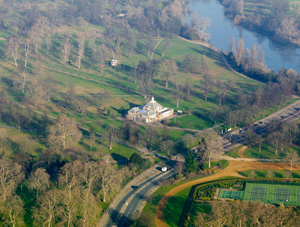 Serpentine Pavilion architects to date are: Serpentine Pavilion architects to date are:
|
|
 |
 |
 |
 |
 |
 |
 |
VIDEO |
 |
|
|
 |
|
 |
 |
 |
| |
 |
|
 |
 |
 |
 |
MATERIALS |
 |
|
|
 |
|
 |
 |
 |
 |
 |
|
 |
 |
 |
 |
LOCATION |
 |
|
|
 |
|
 |
 |
 |

|
 |

|
Continent |
|
 |
  North America |
|
Nation |
|
 |
  United States |
|
State |
|
 |
  California |
|
County |
|
 |
  Los Angeles |
|
Town |
|
 |
  Los Angeles |
|
District |
|
 |
  Hollywood |
|
Address |
|
 |
  La Brea Tar Pits, 5801 Wilshire Blvd, Hancock Park
|
|
|
|
 |
|
Website |
|
 |
|
 |
 |
 |
 |
MAP |
 |
|
|
 |
|
 |
 |
 |
| |
 |
|
 |
 |
 |
 |
|
TYPOLOGY |
 |
|
|
 |
|
 |
 |
 |
|
|
 |
ARCHITECTURE | Commercial buildings
Bars, cafeterias
Urban equipment and structures for public areas
Structures for public areas
Other architectural structures
Pavilions, kiosks, facilities
| |
 |
 |
 |
 |
CHRONOLOGY |
 |
|
|
 |
|
 |
 |
 |
Project |
 |
|
 |
| 
 |
2014 - 2015
|
|
Realisation |
 |
|
 |
| 
 |
2015 - 2015 |
|
 |
 |
 |
 |
CLIENT |
 |
|
|
 |
|
 |
 |
 |
| |
 |
|
 |
 |
 |
 |
DIMENSIONAL
DATA |
 |
|
|
 |
|
 |
 |
 |
| Surface |
 |
|
 |
|
 |
 |
 |
 |
STRUCTURES |
 |
|
|
 |
|
 |
 |
 |
| |
 |
|
 |
 |
 |
 |
STAFF |
 |
|
|
 |
|
 |
 |
 |
Project  |
 |
|
|
 |
|
 |
 |
 |
 |
ANNOTATIONS |
 |
|
|
 |
|
 |
 |
 |
| |
 |
|
 |
 |
 |
 |
CREDITS |
 |
|
|
 |
|
 |
 |
 |
| |
 |
Images © Steven Kevin Howson / SelgasCano
Text edited by Serpentine Gallery
Courtesy of Serpentine Gallery
|
|
 |
  |
 |
|
|